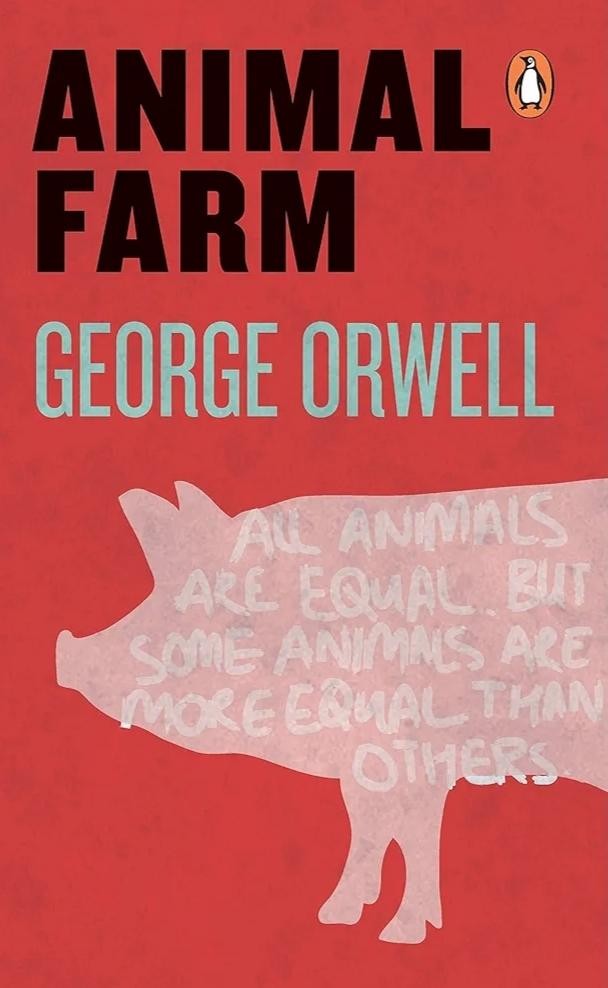
Original Title
Animal Farm
Subject & College
Publish Date
2011-01-12
Published Year
2011
Publisher, Place
Total Pages
92
ISBN 13
9780143416319
Country
India
Language
English
Readers Feedback
Animal Farm
The book was first published in 1945 in England. George Orwell, under the real name Eric Blair, faced publisher reluctance to release “Animal Farm” due...Read More
Prof. Nanasaheb Wagaskar
Animal Farm
The book was first published in 1945 in England. George Orwell, under the real name Eric Blair, faced publisher reluctance to release “Animal Farm” due to its daring satire of the Russian Revolution and the rise of communism. While not explicitly mentioned, political connections are evident as we read the book. Animal Farm tells the story of farm animals who rebel against their oppressive human master in hope for a better life. The story seems simple at first, but as it unfolds, the plot thickens, becoming more intriguing and compelling with every chapter. Orwell’s animal allegory really got me thinking about how the world operates.
The story unfolds with a pig, the Old Commander (symbolizing Karl Marx), inspiring the animals to overthrow Farmer Jones (representing the Tsar) and establish Animalism (Communism) after the Battle of the Cowshed (Bolshevik Revolution). The animals, under the leadership of a boar, Snowball, successfully repel the humans, marking a significant event in the story’s allegory of the Russian Revolution. Orwell cleverly illustrates the shift in power as the animals now control the renamed “Animal Farm,” mirroring the historical transformation of Russia into the Soviet Union.
After their victorious uprising, the animals joyfully govern the farm. The anthem “Beasts of England” (paralleling The Internationale) echoes daily, accompanied by the seven animal commandments, the rallying cry “Four legs good, two legs bad!” and a green flag bearing a painted hoof and horn (reminiscent of the hammer and sickle). Leading the rebellion are the pigs Napoleon (representing Stalin) and Snowball (symbolizing Trotsky). They ruthlessly subjugate the lower animals, imposing strict control with relentless work, food rationing, and subjecting them to grueling and extreme tasks. The once-shared vision of equality crumbles under the oppressive rule of these pig leaders.
In the book, disagreements arise between Snowball and Napoleon. Snowball advocates for a windmill to automate farm tasks and generate electricity at night. Napoleon opposes the idea, ultimately driving Snowball away with his dogs and declaring himself the leader. He “exploits” uneducated animals, making them work more for less food. Despite starvation, Napoleon convinces them they’re better off and not enslaved like other animals. The pigs, protected by fierce dogs trained by Napoleon, turn the lives of the other animals into a genuine hell.
Animal Farm concludes with shattered hopes and irreversible desperation, as the revolutionary leaders transform into profit-driven megalomaniacs, losing their initial ideological fervor.The once-idealistic leaders become “too practical,” echoing popular culture terminology. The final scene vividly illustrates this profound shift, highlighting the stark contrast between their compromised leadership and the origins of the Rebellion.
The book serves as a reflection of human society, revealing the corrupting influence of power on even the most well-intentioned individuals. The initial revolutionary ideals are overshadowed as people exploit each other for personal gain and comfort. Exploring corruption, manipulation, political recession, totalitarianism, and communism, George Orwell’s allegorical novel manages to depict a whole era. Recreating the Soviet age in a seemingly playful, fabled world, Animal Farm makes for a great read with a stunning lesson—still relevant over 80 years after the novel’s publishing. In a world where corruption and dictators are always on the horizon, the story is a must-read in order to educate people of the dangers of a naive and ignorant common-class. It is critical for anyone willing to help make a change in the political world and fight for freedom, and offers a wonderful experience for casual readers and historians alike, as the novel holds much historical significance as well.
On the whole, George Orwell’s Animal Farm is a masterpiece with an amazing plot and ever-relevant lesson. It is powerful commentary on political systems, the abuse of power, and the potential dangers of ideological movements through not feeble but fabulous fable.It is definitely a must read. Believe me, it turns out to be really enjoyable.
